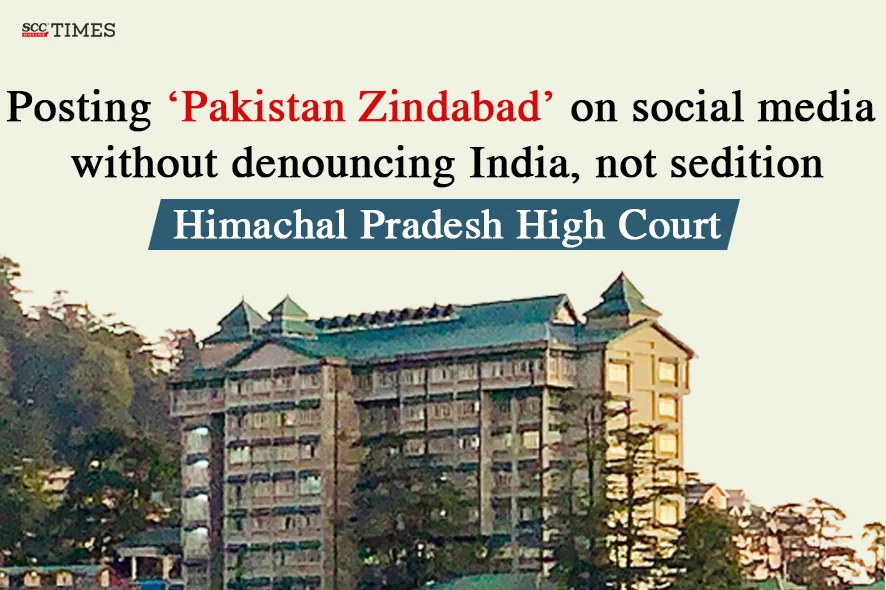Himachal Pradesh High Court: A street vendor (‘petitioner’) was accused of sedition under Section 152 of the Bharatiya Nyaya Sanhita, 2023 (‘BNS’) for allegedly sharing a content on Facebook with the words ‘Pakistan Zindabad’, and thus, he filed the present petition seeking regular bail. A Single Judge Bench of Rakesh Kainthla, while observing that the complaint had no averment as to bringing hatred or discontent towards the government established by law in India and that merely posting ‘Pakistan Zindabad’, without denouncing India, was not seditious, and therefore, directed the petitioner’s release on bail.
Background:
The petitioner was a poor, illiterate street vendor who ran a small fruit cart outside the informant’s shop. It was stated that he allegedly shared an AI-generated image of the Prime Minister with the words ‘Pakistan Zindabad’, which was considered inflammatory and against the nation’s interest. It was contended that petitioner being illiterate was unable to operate social media platforms, and his Facebook account was created by his son and that the informant had access to his mobile phone and had shared the controversial reel.
The petitioner’s counsel submitted that the allegations in the FIR did not satisfy the ingredients of Section 152 BNS as there was no averment in the application that he had incited hatred amongst the members of two groups, or that his act was likely to provoke disharmony or feelings of enmity and only writing ‘Pakistan Zindabad’ by itself did not amount to inciting hatred. The petitioner was in custody since 08-06-2025, and it was prayed that he be released on bail.
The petition was opposed by filing a status report asserting that a complaint was made to the police that the petitioner wrote in favour of Pakistan and against the Prime Minister of India. The police registered the FIR and conducted the investigation, and a charge-sheet was filed before the Court on 06-08-2025. The Additional Advocate General submitted that the relationship between India and Pakistan was strained at the time when the post was shared and writing Pakistan Zindabad was anti-national. Therefore, he prayed that the present petition be dismissed.
Analysis and Decision:
The Court referred to Ajwar v. Waseem, (2024) 10 SCC 768, wherein the Supreme Court held that “while considering as to whether bail ought to be granted in a matter involving a serious criminal offence, the Court must consider relevant factors like the nature of the accusations made against the accused, the manner in which the crime was alleged to have been committed, the gravity of the offence, the role attributed to the accused, the criminal antecedents of the accused, the probability of tampering of the witnesses and repeating the offence, if the accused were released on bail, the likelihood of the accused being unavailable in the event bail was granted, the possibility of obstructing the proceedings and evading the Courts of justice and the overall desirability of releasing the accused on bail”. The same position was reiterated in Ramratan v. State of M.P., 2024 SCC OnLine SC 3068, and Shabeen Ahmad v. State of U.P., (2025) 4 SCC 172.
The Court relied on Vinod Dua v. Union of India, (2023) 14 SCC 286, where it was observed that Section 124-A of the Penal Code, 1860 (‘IPC’) (equivalent to Section 152 BNS) applied to such activities which were intended, or which tend to create disorder or disturbance of the public peace. Further, the Court referred to Javed Ahmad Hajam v. State of Maharashtra, (2024) 4 SCC 156, wherein it was reiterated that written or spoken words must have the tendency or intention of causing public disorder or disobedience of law and order. The intention of causing disorder or inciting people to violence was the sine qua non of the offence.
The Court noted that there was no averment in the complaint that hatred or discontent was brought towards the government established by law in India. The Court opined that hailing a country without denouncing the motherland did not constitute an offence of sedition because it did not incite armed rebellion, subversive activities, or encourage feelings of separatist activities. Therefore, prima facie, there was insufficient material to connect the petitioner with the commission of crime.
The Court observed that the police had already seized the electronic device and filed the chargesheet, and there was nothing to show that custodial interrogation of the petitioner was necessary. Therefore, no fruitful purpose would be served by detaining the petitioner in custody. Consequently, while allowing the present petition, the Court ordered his release on bail in the sum of Rs 50,000 with one surety of the like amount.
[Suleman v. State of H.P., 2025 SCC OnLine HP 4004, decided on 19-08-2025]
Advocates who appeared in this case:
For the Petitioner: Anubhav Chopra, Advocate.
For the Respondent: Lokinder Kutlheria, Additional Advocate General, with Prashant Sen, Ajit Sharma and Sunena Chandhari, Deputy Advocates General.



